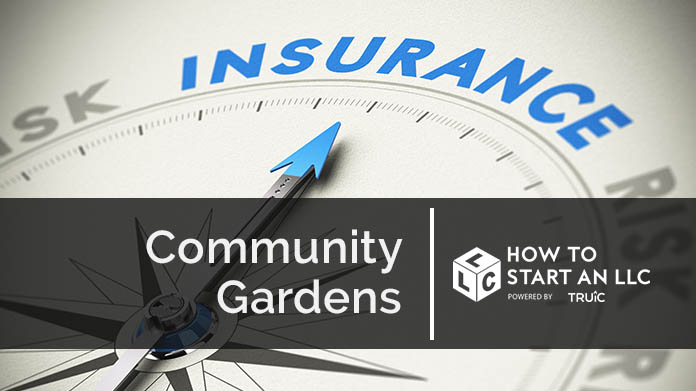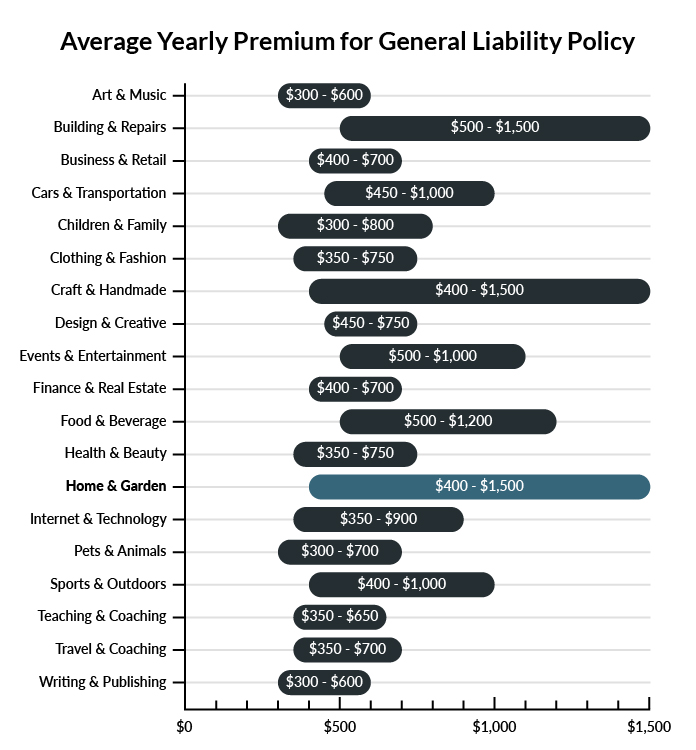Community Garden Business Insurance
Getting insurance for your community garden is essential.
Community gardens need to be protected against things like environmental claims, personal injury claims, and property damage claims.
For example, a neighboring property could be damaged by the garden’s activities, or a visitor becomes injured due to a poorly-maintained walkway.
We’ll help you find the most personalized and affordable coverage for your unique business.

Recommended: Ergo Next Insurance is dedicated to matching small businesses with the right policy at the best price.
Best Insurance for a Community Garden
General liability insurance is — generally speaking — one of the most important insurance policies for community gardens.
Some of the risks general liability insurance covers are:
- Bodily injury
- Property damage
- Medical payments
- Legal defense and judgment
- Personal and advertising injury
Although general liability will be a crucial component of your community garden’s overall coverage, there are a number of other important parts, including:
- Commercial property insurance
- Business interruption insurance
- Workers’ compensation insurance
- Commercial umbrella insurance
- Commercial auto insurance
You are generally presented with two categories of insurance providers when looking to acquire coverage for your business. These are:
- Traditional brick-and-mortar insurers — For example, The Hartford, Hiscox, and Nationwide.
- Online insurers — For example, Ergo Next and Tivly.
Each of these two categories has its own individual approach to providing insurance. We typically recommend online insurers as their digital nature allows for far more affordable prices (due to lower overheads), while their AI technology ensures the coverage quality is still high.
Let’s Find the Coverage You Need
The best insurers design exactly the coverage you need at the most affordable price.
Cost of General Liability Insurance
On average, community gardens in America spend between $400 – $1500 per year for $1 million in general liability coverage.
Compare the average cost of general liability insurance for a community garden to other professional industries using the graph below.
Several factors will determine the price of your policy. These include your:
- Location
- Deductible
- Number of employees
- Per-occurrence limit
- General aggregate limit
You may be able to acquire general liability insurance at a discounted rate by purchasing it as part of a business owner’s policy (BOP) rather than as a standalone policy.
A BOP is a more comprehensive solution that includes multiple forms of coverage, such as business interruption and property insurance.

Find the Best Rate
Discover the best coverage at the lowest rate in our cheapest business insurance review.
Common Situations That General Liability Insurance May Cover for a Community Garden
Example 1: Your client gardeners suffer unintentional exposure to harmful chemicals in the soil and develop numerous symptoms over time. General liability insurance should cover the cost of their medical bills.
Example 2: When an employee fails to properly clear a pathway through the garden, a client gardener trips over a rock and breaks a leg. General liability insurance would help cover the cost of fighting the resulting lawsuit or settling out of court.
Example 3: A client gardener accidentally destroys a valuable part of the land used for the community garden. General liability insurance would help pay to restore the condition of the land to its original state.
Other Types of Coverage Community Gardens Need
While general liability is the most important type of insurance to have, there are several other forms of coverage you should be aware of. Below are some of the most common types of coverage:
Commercial Property Insurance
Your land is the most important part of your community garden. Commercial property insurance would help protect it from storms, vandals, and fires. This coverage also would cover the cost of repairing or replacing any damaged greenhouses or tool sheds on your property after an accident so you can recover quickly.
Business Interruption Insurance
More exposed to the elements than most businesses, a community garden may need to close for weeks or even months to make repairs after a fire or major storm. Business interruption insurance would cover some of your lost revenue, helping to ensure you don’t go out of business before you can reopen.
Workers’ Compensation Insurance
Most states require businesses to carry workers’ compensation insurance for their part-time and full-time employees. This coverage protects your employees if they become injured at work or fall ill after a work-related accident — including chronic injuries like muscle pain from the job’s required stooping, bending, and kneeling. It not only covers an employee’s medical bills and lost wages if they need time to recover but also any disability or death benefits stemming from a work-related accident.
Commercial Umbrella Insurance
Community gardens can pose many potential hazards, depending on the tools and equipment your client gardeners use. While your general liability insurance policy covers most claims, some accidents or lawsuits may be so catastrophic that they threaten to exhaust the limits of your primary coverage. Commercial umbrella insurance protects you from paying out-of-pocket for any legal fees and awarded damages that exceed your primary policy.
Commercial Auto Insurance
Any vehicle you or your employees use primarily for business — such as to transport plants or tools — requires commercial auto insurance to protect the vehicle, driver, and others on the road in the event of an accident. Be sure to select a policy that covers not only accident-related vehicle repair costs and medical treatment for anyone injured but also sufficient protection for any business-related equipment you carry in your vehicles.
Additional Steps To Protect Your Business
Although it’s easy (and essential) to invest in business insurance, it shouldn’t be your only defense.
Here are several things you can do to better protect your community garden:
- Use legally robust contracts and other business documents. (We offer free templates for some of the most common legal forms.)
- Set up an LLC or corporation to protect your personal assets. (Visit our step-by-step guides to learn how to form an LLC or corporation in your state.)
- Stay up to date with business licensing.
- Maintain your corporate veil.
Community Garden Business Insurance FAQ
Yes, absolutely. You will need to first get a quote from an online business insurance provider like Ergo Next Insurance. Ergo Next allows you to then purchase a policy immediately and your coverage will be active within 48 hours.
A typical business owner’s policy includes general liability, business interruption, and commercial property insurance. However, BOPs are often customizable, so your agent may recommend adding professional liability, commercial auto, or other types of coverage to your package depending on your company’s needs.
“Business insurance” is a generic term used to describe many different types of coverage a business may need. General liability insurance, on the other hand, is a specific type of coverage that business owners need to protect their assets.
It is always recommended that you secure the right business insurance for your community garden before it gets off the ground. This should provide it with protection from the outset against all the common risks it is likely to face.
It’s not uncommon for businesses to be legally obligated to carry certain policies depending on their situation and state.
Not necessarily. Certain exceptions may be written directly into your community garden insurance policy, and some perils may be entirely uninsurable.
Yes, an LLC is meant to create a legal barrier between your business and your personal assets and credit. If you haven’t formed an LLC yet, use our Form an LLC guide to get started.
An LLC doesn’t protect your business assets from lawsuits and liability– that’s where business insurance comes in. Business insurance helps protect your business from liability and risk.